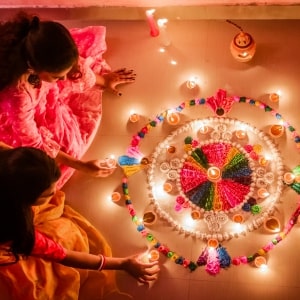Diwali, also known as the Festival of Lights, is one of the most celebrated and significant festivals in India and among Hindus worldwide. This joyous occasion symbolizes the triumph of light over darkness and good over evil. In this article, we will explore 10 key points about Diwali, shedding light on its cultural, religious, and social significance.

- Historical Roots – Diwali’s origins can be traced back to ancient Hindu scriptures, where it commemorates the return of Lord Rama, his wife Sita, and his loyal companion Hanuman after defeating the demon king Ravana. The lighting of lamps symbolizes the victory of light over darkness.
- Religious Significance – Diwali holds religious importance for Hindus, Jains, and Sikhs. For Hindus, it marks the worship of the goddess Lakshmi, the deity of wealth and prosperity. Jains celebrate Diwali to honor Lord Mahavira’s attainment of nirvana, while Sikhs commemorate the release of Guru Hargobind Ji from imprisonment.
- Festival of Lights – The most distinctive feature of Diwali is the illumination of homes and public spaces with earthen lamps, candles, and decorative lights. The twinkling lights not only add a vibrant charm to the surroundings but also symbolize the victory of righteousness.
- Rituals and Traditions – Diwali is characterized by various customs and rituals, including cleaning and decorating homes, performing puja (prayers), exchanging gifts and sweets, and bursting fireworks. Each tradition holds deep cultural and spiritual significance.
- Rangoli Art – A popular Diwali tradition is the creation of rangoli, intricate and colorful floor designs made with colored powders, rice, or flower petals. These vibrant patterns not only enhance the festive ambiance but also invite good luck and positive energy.
- Feast and Sweets – Diwali is a time for indulging in delicious food and sweets. Families prepare an array of mouth-watering dishes, and the exchange of sweets is a common practice, symbolizing the sharing of joy and happiness.
- Gift-Giving Tradition – Exchanging gifts during Diwali is a gesture of love and goodwill. Families and friends present each other with sweets, clothes, and decorative items, reinforcing the spirit of togetherness and generosity.
- Economic Impact – Diwali is not just a religious and cultural event but also a significant economic driver. The festival sees a surge in shopping, with people buying new clothes, jewelry, and household items, contributing to the local economy.
- Environmental Concerns – In recent years, there has been a growing awareness about the environmental impact of Diwali celebrations, particularly the use of fireworks. Many communities are now opting for eco-friendly celebrations to reduce air and noise pollution.
- Global Celebration – While Diwali has its roots in India, it has transcended cultural boundaries and is celebrated by diverse communities worldwide. Major cities around the globe witness Diwali events, fostering cultural exchange and understanding.
These 10 points about Diwali provide a holistic understanding of the Festival of Lights, delving into its historical roots, religious significance, and rich traditions. As we embrace the illuminating spirit of Diwali, let these insights enhance your appreciation for this cultural extravaganza. May the joy, warmth, and positivity of Diwali brighten your life and inspire a deeper connection with the traditions that make this festival truly special.
Also Read: 10 Reasons to Celebrate Diwali





